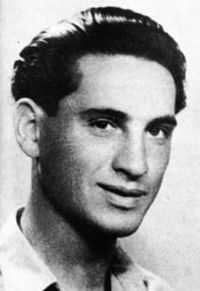Meir Feinstein

Meir Feinstein (Hebrew: מאיר פיינשטיין; October 5, 1927 - April 21, 1947) was born in the Old City of Jerusalem. His parents, Bela and Eliezer, immigrated from Brisk. He was an Irgun operative who lost an arm on Oct. 30, 1946 while planting a bomb in the railway station in Jerusalem, and was subsequently captured and sentenced to death by the British authorities in Palestine. At his trial, Feinstein refused legal counsel and refused to recognize the authority of the British court or participate in the trial, other than to speak at the summation. Before the reading of the verdict Feinstein broke his silence, saying:
Officers of the army of conquest! A regime of hanging trees is the regime you wish to impose on this land, which was destined to be a lighthouse for all of humanity, and in your foolish wickedness, you presumed that by this regime you will break our people's spirit, the people to whom this whole country had been a gallows. You were wrong. You will learn that you have encountered steel, steel forged in the fire of love and hatred - love for the homeland and freedom, hatred for enslavement and invader. Burning steel it is. You will not break it. You will burn your hands.
How great is your blindness, British tyrants? Did you not notice who stands against you in this campaign, unexampled in the history of mankind? Shall you scare us with death? We, who have listened for years to the rattling of the wheels of them Railroad cars, who led our brothers, our parents, the best of our nation - to slaughter, which too had no precedent in human history? We, who asked, and ask ourselves everyday: in what are we better than them? From the millions of our brothers? What have we won? For we could have been among them and with them in the days of fear and in the moments of dying.
And to these recurring questions, there is in our conscience but one answer: we remained alive not to live and await in conditions of slavery and oppression, a new Treblinka. We remained alive, to ensure life, freedom and dignity for us, for our nation, for our children and their children for generations to come. We remained alive so that it wouldn't matter anymore that which happened there and might happen under your rule, the rule of treason, the rule of blood.
Therefore we shall not be frightened, for we have learned and by countless of victims for nothing we have learned - that there is life worse than death, and there is death greater than life…
Twenty years after the trial, it became known that a third co-conspirator, Daniel Azulai, whose death sentence was commuted to life imprisonment, was in fact a plant of SHAI, the intelligence service of the Haganah. Feinstein was unaware of this, seeing Azulai as a close friend and Irgun sympathizer.
On April 21, 1947, a few hours before their execution by hanging in the Jerusalem Central Prison in the Russian Compound, now the Museum of the Underground Prisoners, could be carried out, he and his friend and fellow prisoner Moshe Barazani blew themselves up in their cells with improvised grenades which had been smuggled in concealed inside hollowed out oranges. Originally, Feinstein and Barzani planned to use one grenade to attack the hanging party and the second grenade to kill themselves; however, when they learned that Rabbi Goldman, the official chaplain of the Jewish National Council, was to be among the party, they changed their plans in order to spare his life, killing themselves alone (reference needed).
The story of Feinstein and Barazani became one of the most famous tales in the history of Zionism.[1] Menachem Begin was so moved by the deeds of the two men that he requested in his will that he be buried next to them on the Mount of Olives, which he was.[2]
Just before his death, Feinstein gave to British prison guard Thomas Henry Goodwin, whom he and Barazani had nicknamed "the good jailer", a copy of the Bible, inscribed in Hebrew and English, "In the shadow of the gallows, 21.4.47. To the British soldier as you stand guard. Before we go to the gallows, accept this Bible as a memento and remember that we stood in dignity and marched in dignity. It is better to die with a weapon in your hands than to live with hands raised. Meir Feinstein". He then requested a moment of privacy for prayer, which prevented Goodwin from being able to stop the grenade being detonated (saving Goodwin from being injured by the grenade). In 2007, Goodwin's son Denis donated the Bible to Feinstein's nephew Eliezar, who received it on behalf of the Underground Prisoners Museum in Jerusalem at a commemorative state ceremony.,[2][3]
References
- ↑ The Good Jailer, Yair Sheleg, Haaretz, April 12, 2007.
- ↑ 2.0 2.1 60 Years Later: Feinstein's Bible Returned to Family Begin Center Diary
- ↑ 'The good jailer' returns Irgun hero's Bible 60 years later, Jerusalem Post, April 19, 2007
|